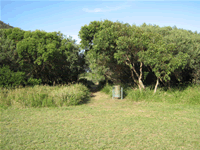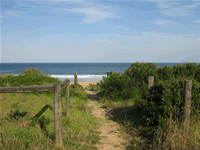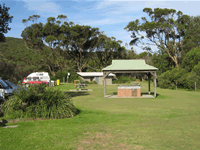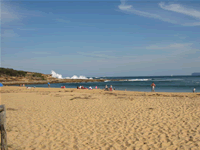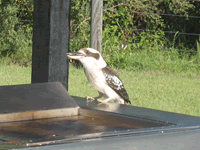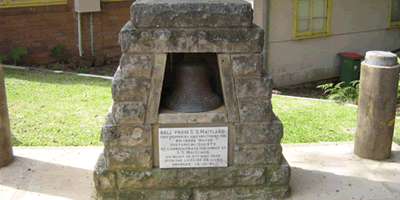
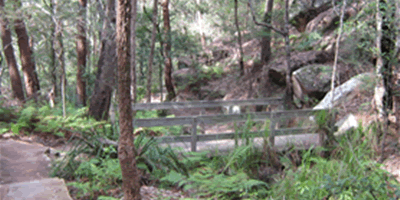
|
|
Bouddi, the local Aboriginal name for the area, became a state park in 1967 and then a national park following an amendment to the National Parks and Wildlife Act in 1974. The park contains approximately 1189 hectares of spectacular coastal landforms and environments just 20km from Gosford on the northern side of the mouth of the Hawkesbury River. Bouddi National Park also includes a marine extension some 287 hectares in size that stretches from Gerrim Point to Third point. Bouddi has a complete range of coastal landforms including offshore reefs, coastal cliffs, rock platforms, beaches and sand dunes. On Bombi and Mourawong Moors perched sandunes occur between 90 and 120 metres above sea level demonstrating the effects of sea level change during the Pleistocene era. A number of plant communities occur within the park of interest including palm dominated open forest in sheltered gullies and open heath and low open woodland on perched sand dunes. Tall open forest is characteristic of the lower slopes and valleys. The winter flowering vegetation on the coastal heath communities provide host to a variety of migratory birds such as honeyeaters during the cooler months. To date 155 bird species, 26 species of mammal, 16 species of reptiles, 16 of amphibian and more than 20 species of vulnerable or threatened native animals have been recorded within Bouddi or lands directly adjacent the park. The little tern (sterna albifrons) is listed as endangered and occurs occasionally within the park. The tall forest provides permanent shelter to 3 endangered species of owl, namely the Sooty Owl, the Masked Owl and the Powerful Owl. Peregrine Falcons are known to nest on sea cliffs north of Maitland Bay. Glossy Black Cockatoos can be found in casurina groves dotted throughout the park. The variety of of habitats within the park allow it to play host to a wide range of mammals such as the Nothern Brown Bandicoot, the Swamp Rat, and common bush rats. In the taller forests Greater Gliders and Sugar Gliders cans be found as well as a number of species of flying foxes and bats. A number of marine animals are also recorded in the marine extension of the park from time to time such as fur seals, leopard seals, bottled-nose dolphins, common dolphins, humpback whales and southern right whales. The taking of fish, worms, nippers,shellfish or crustaceans from the marine extension is prohibited. Prior to European settlement the Guringgai people lived in the areas in and around Bouddi and evidence of their occupation includes rock engravings, axe grinding grooves and rock shelters, some of which are of archeolgical interest and over 57 sites have been documented so far. Due to vandalism of some sites the location of most of the 57 sites are not publicised or promoted. Places of InterestThe S.S. Maitland was wrecked off Bouddi Point in 1898 and its remains still lie on the rock platform at the norther end of Maitland Bay. The ships bell was recovered in 1959 and mounted on a podium outside the Maitland Bay Store. The Maitland Store was originally a residence and a small shop that served refreshing beverages to early park visitors. It was acquired by the parks service in 1970. Military Emplacement remains can still be seen near Mount Bouddi. They were constructed during World War II as part of Sydney's defenses. Maitland Bay Shelter was originally built in May 1940 by volunteers but is now maintained by the NPWS as a tribute to early park workers.
CampingLittle Beach camping area Location: Little Beach, near MacMasters Beach. Getting there: There's a 750 metre walk to the campground from the car park at the end of Grahame Drive. Roads are paved. Facilities: 6 sites, Pit/composting toilets, electric/gas barbecues. Things to do: Bouddi Coastal Walk, picnicking, and fishing. Wood fires are not permitted. Fees: $8.00 per adult per night, $4.00 per child per night. No vehicle fees apply. Tallow Beach camping area
Getting there: There's a medium walk (1 km) from the carpark and gate on Hawke Head Drive to the campground. Roads are paved. Facilities: 6 sites, Pit/composting toilets. Things to do: Tallow Beach is an unpatrolled beach where you can swim, surf and fish. Box Head Walking Track and Flannel Flower/Lobster Beach Walking Track are nearby. No barbecues are provided and wood fires are not permitted (fuel stoves only). Fees: $5.00 per adult per night, $3.00 per child per night. No vehicle fees apply. Bookings: Bookings are essential (phone 4320 4203) Putty Beach camping area
Location: Putty Beach, near Killcare. Getting there: The campground is easily reached by car from Killcare. Roads are paved. Facilities: 18 sites, Drinking water, flush toilets, cold showers, picnic tables, electric/gas barbecues, rubbish bins. More details: The main features are at the eastern end of Putty Beach, which provides good swimming and the start of the Coastal Walk. Wood fires are not permitted. Important note: Showers are open-air, and have been closed temporarily due to the current Level 4 water restrictions. Fees: $8.00 per adult per night, $4.00 per child per night. Annual pass or daily vehicle entry fee of $7 also required.
© 2008 Centralcoast.info |
